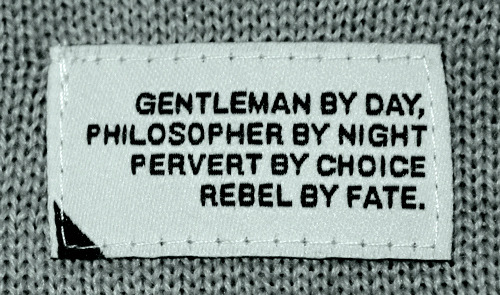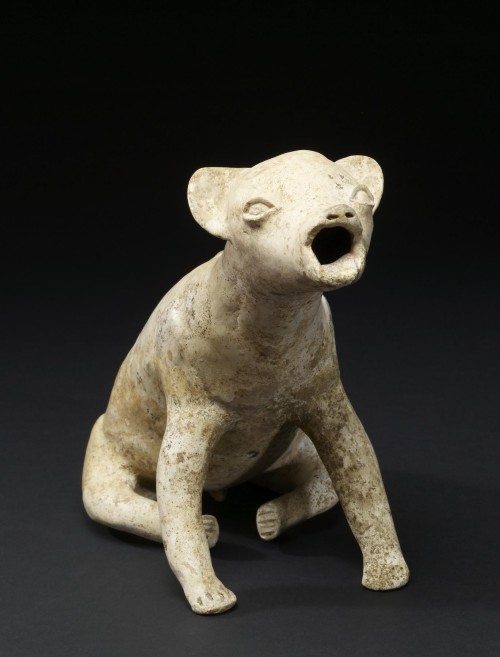Not Necessarily In That Order...
Not necessarily in that order...

More Posts from Ilunado and Others

1.5 metros de la calle para los ciclistas, ¡siempre!

Day 39 _ Bicycle.
After only about nine months of life, people even forget who their mothers were
Kurt Vonnegut Gálapagos
Cómo investigar cómo escapamos de la realidad.
Los perros de Colima

Howling Dog Effigy, Jalisco, 300 BC-AD 200.
Why were dogs so significant to the Mexica?
Dogs were associated with the god of death, Xolotl, among the Mexicas of the highlands of Mexico. Both a dog and Xolotl were thought to lead the soul to the underworld. The skinny body and white hue of the shown dog represented above may have underworld connotations, connecting it to this belief. Xolotl was also associated by the Mexica with the planet Venus as the evening star, and was portrayed with a canine head.
The dog’s special relationship with humans is highlighted by a number of Colima dog effigies wearing humanoid masks. This curious effigy type has been interpreted as a shamanic transformation image or as a reference to the modern Huichol myth of the origin of the first wife, who was transformed from a dog into a human. However, recent scholarship suggests a new explanation of these sculptures as the depiction of the animal’s tonalli, its inner essence, which is made manifest by being given human form via the mask.
The use of the human face to make reference to an object’s or animal’s inner spirit is found in the artworks of many ancient cultures of the Americas, from the Inuit of Alaska and northern Canada to peoples in Argentina and Chile. (Walters)
On the subject of the significance of dogs, and dog effigies wearing humanoid masks, check out this post from a while back of ‘examples of dogs represented in ancient Mexican art.’ The final artefact here is from Colima, and shows a dog wearing a human mask.
Courtesy of & currently located at the Walters Art Museum, Baltimore, USA, via their online collections, 2009.20.148.










El Día de la Danza en la Ciudad de México Por: Pablo A. Tonatiuh
The neuroscientist Antonio Damasio explains how minds emerge from emotions and feelings.
La UNESCO lidera este Día, pero destaca que no es su propietaria. Pertenece a cualquiera a quien le interese el pensamiento.
Por ese motivo, el Día Mundial de la Filosofía debe suponer un ejercicio de pensamiento libre, razonado e informado sobre los mayores desafíos de nuestro tiempo.

Night Hawk, Derrick Lin
-
 kimberlocster reblogged this · 8 months ago
kimberlocster reblogged this · 8 months ago -
 kimberlocster liked this · 8 months ago
kimberlocster liked this · 8 months ago -
 gerbilmongolski reblogged this · 9 months ago
gerbilmongolski reblogged this · 9 months ago -
 andromeda-or-andromache-maybe reblogged this · 1 year ago
andromeda-or-andromache-maybe reblogged this · 1 year ago -
 misqui reblogged this · 1 year ago
misqui reblogged this · 1 year ago -
 subverteretrance liked this · 1 year ago
subverteretrance liked this · 1 year ago -
 necesito-vodka reblogged this · 1 year ago
necesito-vodka reblogged this · 1 year ago -
 orionblue reblogged this · 2 years ago
orionblue reblogged this · 2 years ago -
 ensilencio reblogged this · 3 years ago
ensilencio reblogged this · 3 years ago -
 a-mandarina liked this · 3 years ago
a-mandarina liked this · 3 years ago -
 f-liiix liked this · 3 years ago
f-liiix liked this · 3 years ago -
 machnmb liked this · 3 years ago
machnmb liked this · 3 years ago -
 machnmb reblogged this · 3 years ago
machnmb reblogged this · 3 years ago -
 asphyx-xie reblogged this · 3 years ago
asphyx-xie reblogged this · 3 years ago -
 praetorianxxiv liked this · 3 years ago
praetorianxxiv liked this · 3 years ago -
 plunetzero reblogged this · 3 years ago
plunetzero reblogged this · 3 years ago -
 plunetzero liked this · 3 years ago
plunetzero liked this · 3 years ago -
 mikes81vw liked this · 3 years ago
mikes81vw liked this · 3 years ago -
 mikes81vw reblogged this · 3 years ago
mikes81vw reblogged this · 3 years ago -
 ensilencio reblogged this · 3 years ago
ensilencio reblogged this · 3 years ago -
 negativitydemon liked this · 3 years ago
negativitydemon liked this · 3 years ago -
 b0rn-s1nn3r reblogged this · 3 years ago
b0rn-s1nn3r reblogged this · 3 years ago -
 00z reblogged this · 3 years ago
00z reblogged this · 3 years ago -
 nnjaxo liked this · 3 years ago
nnjaxo liked this · 3 years ago -
 12cellphones reblogged this · 3 years ago
12cellphones reblogged this · 3 years ago -
 zenofwealth liked this · 3 years ago
zenofwealth liked this · 3 years ago -
 tinmanmatt92 reblogged this · 4 years ago
tinmanmatt92 reblogged this · 4 years ago -
 gorgeousgirl-94 liked this · 4 years ago
gorgeousgirl-94 liked this · 4 years ago -
 jam1784 liked this · 4 years ago
jam1784 liked this · 4 years ago -
 zeyjonzey reblogged this · 4 years ago
zeyjonzey reblogged this · 4 years ago -
 zeyjonzey liked this · 4 years ago
zeyjonzey liked this · 4 years ago -
 king945 reblogged this · 4 years ago
king945 reblogged this · 4 years ago -
 king945 liked this · 4 years ago
king945 liked this · 4 years ago -
 soulmeetsworld reblogged this · 4 years ago
soulmeetsworld reblogged this · 4 years ago -
 sassyturtleeclipseclam liked this · 4 years ago
sassyturtleeclipseclam liked this · 4 years ago -
 wearealldrugss-blog liked this · 4 years ago
wearealldrugss-blog liked this · 4 years ago

